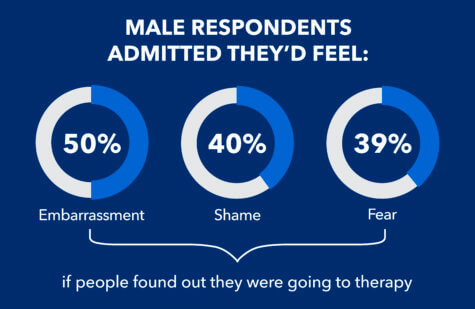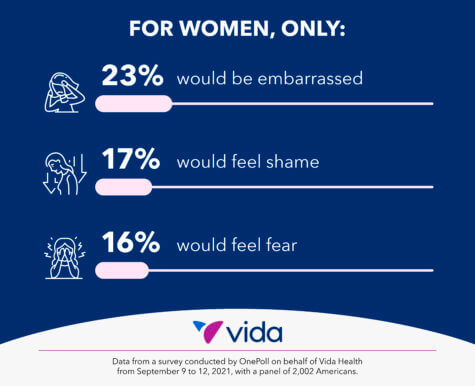NEW YORK — The myth that “boys don’t cry” just got another nail in its coffin. You may be surprised by the results of a new survey that show men tend to cry more often than women. Are 21st century men more sensitive than generations past?
According to the poll of 2,004 Americans, men cry on average about four times a month. Women, on the other hand, weep about three times in a given month. That’s 48 times a year for men and only 36 for women.
Men cry — and they do something about it, too
The stereotype that men don’t seek professional help for their mental health also seems inaccurate — as two-thirds of male respondents have done so at some point in their lives, compared to just half of the women.
Despite those numbers, the survey — conducted by OnePoll on behalf of Vida Health — still finds evidence of a stigma surrounding men seeking help. Other stereotypes appear to hold true, as men (63%) are almost twice as likely as women (34%) to hide the fact that they’re getting treatment for their mental health.
Male respondents also admit they’d feel embarrassment (50%), shame (40%), or fear (39%) if those close to them found out they were going to therapy. By contrast, just 23 percent of female respondents would feel embarrassment, 17 percent would feel shame, and only 16 percent would feel fear.
Mental health stigmas can lead to dangerous behavior
 Those heightened feelings of shame may be why men dealing with mental health conditions confessed more frequently to using coping behaviors like alcohol abuse (49%), substance abuse (40%), and self-harm (35%).
Those heightened feelings of shame may be why men dealing with mental health conditions confessed more frequently to using coping behaviors like alcohol abuse (49%), substance abuse (40%), and self-harm (35%).
Those behaviors appear to be far less common among women. Only 27 percent reported alcohol abuse, 23 percent admitted to substance abuse, and 20 percent resorted to self-harm to cope. Only 32 percent of all respondents disagree that men are less emotional than women and therefore less likely to suffer from mental health problems.
Meanwhile, 55 percent think that women have better support systems than men so they’re more likely to get help for their mental health.
“We know for many men, the stigma about being vulnerable and seeking help for their mental health is still very prevalent today,” says Mark Hedstrom, US Executive Director of Movember, in a statement. “As a society, we need to break down these barriers and help men understand the importance of opening up and getting help during those difficult moments. We also need to look out for each other. Check in on the men in your life — it could literally be a conversation that might save a life.”
Destigmatizing mental health
 Overall, almost two-thirds of respondents agree that there still is a stigma surrounding people wanting help for their mental health — 61 percent of women and 69 percent of men. Regardless of gender, 40 percent of the poll believe that men are more likely to face this stigma, compared to 34 percent who think women are most likely to face it.
Overall, almost two-thirds of respondents agree that there still is a stigma surrounding people wanting help for their mental health — 61 percent of women and 69 percent of men. Regardless of gender, 40 percent of the poll believe that men are more likely to face this stigma, compared to 34 percent who think women are most likely to face it.
Interestingly, 43 percent of baby boomers (57 years and older) think men face a mental health stigma, but only 15 percent of them think women are likely to. The source of that stigma? Both genders say that most often it’s their friends and family.
For men, they believe friends are far more likely to stigmatize them (19%) compared to only 13 percent of women saying the same.
“Over the past two years we’ve made tremendous progress in destigmatizing mental health ailments, but there’s still so much work to be done — especially for men,” adds Vida Health Chief Clinical Officer Chris Mosunic, PhD. “So many men feel like they need to keep their feelings to themselves, tucked away and shielded, otherwise they’ll be labeled as weak and lesser-than. In reality understanding those feelings, embracing them, and seeking out the assistance that can help them feel better is just about the bravest and strongest thing a person can do.”
